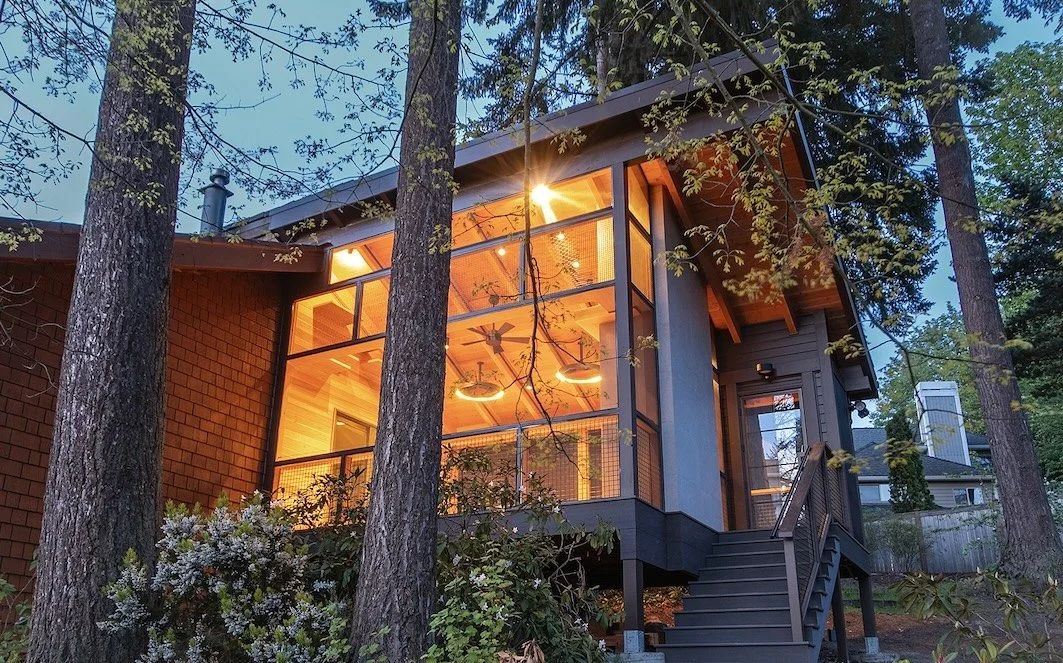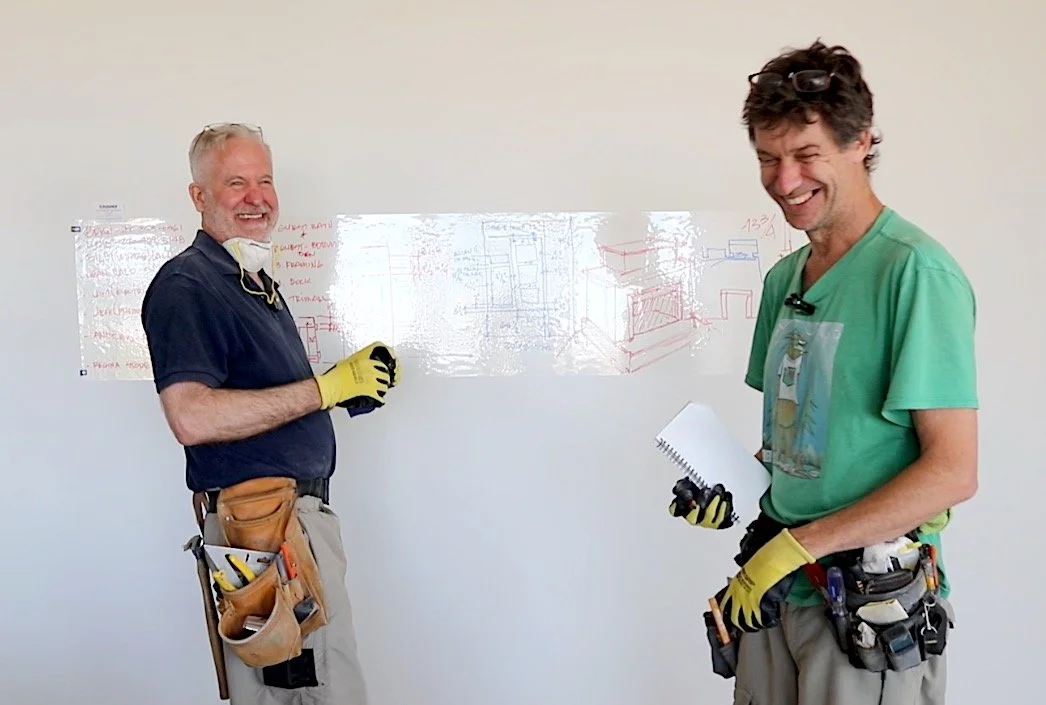
Our sweet spot: no surprises except for the final reveal.
How to Find An Amazing Contractor: Part 1
The Inside Scoop
Homeowners and new home buyers often need repairs, remodeling, and home expansion. There is a high demand for construction services in the Seattle area, making great contractors harder to find. How do we find (or help our clients find) the contractor of their dreams?
Every month this summer, we'll email you part of a three-part series that details insider information written by a successful licensed contractor who is also an experienced designer. We hope it will bolster your current knowledge and/or be a great reference for your clients.
Part one shares the "inside scoop" on contractor complaints and contractors' experience requirements. We'll also detail characteristics of great contractors and the types of construction companies to choose from.
Second place, second-rate
Did you know that contractors get the second-most consumer complaints nationwide? Automotive sales and repair is number one. According to the yearly Consumer Federation of America Study, it’s been this way for most of the past 17 years. Unfortunately, this means contractor nightmares will likely continue to be a common hazard.
Typical consumer complaints about their contractor:
“There were so many hidden costs.”
“The project took too long.”
“They never call me back.”
“I was not given a schedule.”
“I ended up managing the project myself.”
“My house and yard were a mess.”
Contractor experience requirements? Non-existent!
Did you know Washington State has no requirements regarding experience, education, testing, or screening to become a licensed general contractor? The would-be contractor simply fills out an online form anonymously, pays a $132.60 fee, and posts bond and insurance. THAT'S IT. They are then licensed to use thousands (or hundreds of thousands) of your hard-earned dollars to build you something. With such a low bar to enter the profession, it's imperative to do due diligence to find a contractor that is the right fit and avoid a potential nightmare.
Great contractors
All contractors are different, but these are the characteristics -- personal attributes and learned skills -- that the great ones have:
Honest and trustworthy
Able to meet your expectations
Communicative -- instilling trust, confidence, and reassurance
Excellent at solving many different kinds of problems
Great at managing quality, time, and money
Types of construction businesses
These are the main business formats in the construction industry:
Individual contractor: A general contractor with one or two helpers or carpenters.
Small company: A general contractor, project manager, a few carpenters, and administrative support.
Large company: One or multiple general contractors, project managers, several construction crews, and administrative support.
Design-build company: Any of the above variations plus the company has design expertise and manages both the design AND construction of your project.
Pros & Cons of Contracting Company Formats
Solo Handyman: One person who may or may not be a general contractor.
Pros: Very direct personal communication, usually only does small projects and repairs, often the least expensive
Cons: May have limited technical and management skills, only small repairs and projects, easily overbooked.
Individual Contractor: A general contractor with one or two helpers or carpenters.
Pros: More direct project involvement from the contractor, good quality control, easier project influence by client, more effective problem solving.
Cons: May need to wait longer to start your project, more easily overbooked causing delays, may be specialized in certain projects.
Small company: A general contractor, project manager, a few carpenters and administrative support.
Pros: Generally good quality control and client communication, varied expertise, can shift workers to help meet deadlines.
Cons: More layers may hinder communication, overhead can increase budget, accountability and quality could slip.
Large company: One or multiple general contractors, project managers, several construction crews and administrative support.
Pros: Can handle large scale projects, varied expertise, can reallocate staff to meet project requirements or take on your project right away.
Cons: Your Influence and communication may suffer, overhead and support staff dramatically increases costs, project may get lost or handed off to several people in the company endangering important details, your project may become unimportant or be staffed with less skilled workers, problem solving is indirect or arduous, accountability and quality can suffer.
Design-build company: Any of the above variations plus the company has design expertise and manages both design AND construction of your project.
Pros: Design and construction inform each other creating more stable budgets and predictable timelines, design build promotes predictable execution, the designer and builder are the same company thus minimizing delays and miscommunications, enables more effective and timely problem solving, easier to meet client expectations.
Cons: Over budget designing can be used to upsell you. Contractors who are also trained designers are very rare. Some contractors may sell themselves as designers but lack experience. If the designer and contractor are different people details and efficiency can suffer.
Do you have questions and want to discuss this topic or another design-build related topic? We look forward to seeing and serving you when you're ready to explore making your dream project a reality!
How to Find An Amazing Contractor: Part 2
You can’t get what you want unless you know what you want!
Many of us love to get something of high quality at a low price. We feel even better when that product or service helps us meet our need or achieve our goal quickly. This is called a triple win, kind of like a triple play. And unfortunately, it’s just as rare.
The same applies to picking the right contractor: a triple play is rare. Establishing real (not aspirational) expectations will set the stage for a project without a tug-of-war between what you want and what the contractor can deliver. Getting this balance is the foundation of a great contractor–client relationship.
To avoid a contractor nightmare, I recommend prioritizing the following:
Time. Is being on time and meeting deadlines vitally important to you?
Quality. Is high quality and great craftsmanship important so that you love looking at the results every day? The experience you have working with your contractor is also part of quality.
Money. Do you have a limited budget or simply need to spend as little as possible?
When looking for the right contractor, I generally expect to pick two items from the list above. It’s unlikely that you will get great quality if you have limited money and need your contractor to meet deadlines consistently and finish on time. If quality is secondary, then it’s possible to get things done on time with less money. It’s also likely that if you have all the time in the world or don't care when things get done (and you have limited budget) you could probably find workers that will do quality work.
If high quality work and a quality experience are important, along with predictable timing, then it’s unlikely you will be able to spend a minimal or limited amount of money. Market forces simply do not facilitate construction projects with wonderful, communicative and helpful contractors that do great work—and that will take on projects for limited budgets and meet all the deadlines on schedule.
Setting the right expectations for yourself will mean you will need to know what matters to you. More importantly, it will set the stage for a smooth-running relationship with your contractor that isn’t bogged down with inappropriate expectations that lead to conflicts.
Stay tuned for our next installment, coming soon: Compelling interview questions to reveal your contractor’s true self!
How to Find An Amazing Contractor: Part 3
Compelling interview questions to reveal your contractor’s true self!
It’s easy for a prospective contractor to agree with what you expect or want. When you’re making an investment as big as home remodel or renovation, it’s important to get to insights into the contractor as a person and professional, and how they operate.
The questions below are focused not on you or what you want; they are atypical and designed to reveal valuable insights about the contractor. These queries will put them on the spot. Let them be surprised or uncomfortable, that’s okay!
QUESTIONS
1. What are your qualifications and attributes?
Do their answers reflect the following attributes:
Love what they do
Are honest and trustworthy
Want to make you happy
Orchestrate and oversee your project
Meet your expectations from daily interactions to the final result
Communicate to instill trust, confidence and reassurance
Maintain good relationships with good subcontractors
Solve problems collaboratively and efficiently
Manage time and money effectively and transparently
Maintain and ensure quality standards
2. What are your favorite projects?
Often the best results are achieved when people do what they love. See if their favorites are similar to your desired project.
3. What specific techniques do you use to stay on time and on budget?
The keyword here is “specific.” Possible techniques include instinct, spreadsheets, Gantt charts, monthly balance and expense sheets. Whatever the means, the contractor should be able to articulate specific techniques they use. If s/he can't, they may be one of those overrun, over budget, and overboard contractors to avoid.
4. What level of quality should I expect?
Meeting your expectations is key to a great experience and great result. Quality of the products, craftsmanship, and finishes are a critical part of this. They should have a sense of their quality level in relation to other projects or contractors.
5. How do you ensure you can meet your client’s expectations?
Getting the project just right requires conscious effort. You want what you want, so how do they ensure they are able to meet and deliver on your vision?
6. Give me some examples where things went wrong and how you resolved them?
This is good for assessing honesty and what you may experience if something goes awry. See if they resolved things in a way that would make you happy, especially around key concerns that are meaningful to you.
7. Who will be working on my project and what are their qualifications?
Is the person you are interviewing the one who will be doing the work? If not, who will be the person/people in your home every day? What qualifications do they have? Are they polite? Neat? Conscientious? Honest? We advise meeting the person who will be leading your project if it isn’t the person giving you the bid.
8. How and when will we be communicating?
Communication is vital for status updates, peace of mind, and for collaborating on the myriad of refinements that are necessary during construction to ensure the outcome is just right.
9. Can I speak with four or five of your past clients?
This is another good spot put-er-on-er. It’s common for just about any contractor to have one or two clients who are happy enough with their project and willing to serve as a reference. A really great contractor will easily have four to six to are available to chat with prospective clients.
NOTE: This doesn’t mean you need to talk to all of them! You merely want to see if they are comfortable with the inquiry and how they respond to the request.
We welcome the opportunity to meet with you to discuss your project and answer your questions and address potential concerns. Click below to meet of our team and view some of our past projects. We look forward to connecting!



